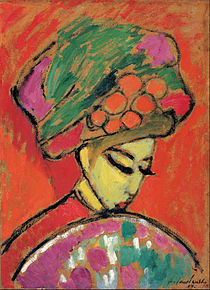Alexei Jawlensky
| Alexej von Jawlensky | |
|---|---|

Self-portrait, 1905
|
|
| Born | 13 March 1864 Torzhok, Tver Governorate, Russian Empire |
| Died |
15 March 1941 (aged 77) Wiesbaden, Germany |
| Nationality | Russian |
| Known for | Painting |
| Spouse(s) | Helene von Jawlensky |
 |
|
|
|
Alexej Georgewitsch von Jawlensky (Russian: Алексей Георгиевич Явленский) (13 March 1864 – 15 March 1941) was a Russian expressionist painter active in Germany. He was a key member of the New Munich Artist's Association (Neue Künstlervereinigung München), Der Blaue Reiter (The Blue Rider) group and later the Die Blaue Vier (The Blue Four).
Alexej von Jawlensky was born in Torzhok, a town in Tver Governorate, Russia, as the fifth child of Georgi von Jawlensky and his wife Alexandra (née Medwedewa). At the age of ten he moved with his family to Moscow. After a few years of military training, he became interested in painting, visiting the Moscow World Exposition c. 1880. Thanks to his good social connections, he managed to get himself posted to St. Petersburg and, from 1889 to 1896, studied at the art academy there, while also discharging his military duties. Jawlensky gained admittance to the circle of Ilya Repin, where he met Marianne von Werefkin, one of Repin's former students and a wealthy artist four years Jawlensly's senior who gave up her career to promote his work and provide him with a comfortable lifestyle.
Free to pursue his artistic vision, he moved to Munich in 1894, where he studied in the private school of Anton Ažbe. In 1905 Jawlensky visited Ferdinand Hodler, and two years later he began his long friendship with Jan Verkade and met Paul Sérusier. Together, Verkade and Sérusier transmitted to Jawlensky both practical and theoretical elements of the work of the Nabis, and Synthetist principles of art.
...
Wikipedia
